September 16, 2014
Edited by David Sanders
Specimen Days
1861 – Owen Seaman, poet/editor (Punch), is born.
1863 – Alfred Victor Comte de Vigny, poet, dies.
1883 – William Carlos Williams, American poet, is born.
1916 – Ove J Abildgaard, Danish poet (Uglegylp), is born.
1922 – Agostinho Neto, poet/president Angola [or Dec 27], is born.
1938 – Bruno Jasieński, Polish poet (b. 1901), dies.
1963 – Rami Saari, Israeli poet and translator, is born.
1863 – Albartus Telting, Fries poet/2nd-Member of parliament, dies.
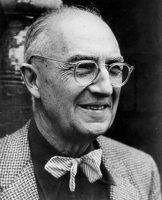
Approach of Winter
The half-stripped trees
struck by a wind together,
bending all,
the leaves flutter drily
and refuse to let go
or driven like hail
stream bitterly out to one side
and fall
where the salvias, hard carmine–
like no leaf that ever was–
edge the bare garden.
—William Carlos Williams (1883–1963)
The half-stripped trees
struck by a wind together,
bending all,
the leaves flutter drily
and refuse to let go
or driven like hail
—William Carlos Williams (1883–1963)
World Poetry
The Unrecognized Greatness of the Mexican National Poet
Millions of Mexicans know Ramón López Velarde as the author of Suave Patría, the national poem of Mexico and a modernist masterpiece, but few inside or outside Mexico know about the extraordinarily high opinion of López Velarde held by his fellow greats of Latin American poetry. There's no better time to let the world know than now, during the present Hispanic Heritage Month and near the approaching Mexican Independence Day. Nobel Laureate Pablo Neruda called López Velarde, "the essential and supreme poet of our extensive Americas… [He] gave to the poetry of the Americas a flavor and a fragrance that will last forever." More.
There’s no better time to let the world know than now, during the present Hispanic Heritage Month, the greatness of Ramón López Velarde.
Recent Reviews
The Ecstatic Blankness Of Poet Louise Glück
by Annalisa Quinn
Louise Glück is in love with silence — her poems strain towards nothingness. "The unsaid, for me, exerts great power: often I wish an entire poem could be made in this vocabulary," she once wrote in an essay. In her new collection, Faithful and Virtuous Night, one poem features a painter, aging and facing his own decline, who paints canvases that are "immense and entirely white." There is something very like the white canvas in Glück's new collection — words, though obviously chosen with extraordinary care, somehow add up to a blankness — the speaker of one poem, looking at his watch, realizes " … the serene transit of the hour hand / no longer represented my perception of time / which had become a sense of immobility / expressed as movement across great distances." It's so restrained, so carefully empty while still giving the illusion of depth (time, perception, movement, distance!). More.
‘Moon Before Morning’ Shows Why W.S. Merwin Is Our Greatest Living Poet
by Arlice Davenport
Superlatives stake out a dangerous terrain for the critic; they tempt us to make absolute statements and inflexible pronouncements – all for the sake of our own security rather than for the sake of truth. Even so, it’s impossible for me not to claim that W.S. Merwin is the greatest poet writing in America today. At 86, he possesses the vigor and vision of his younger self. Indeed, in the meditative poems that make up “The Moon Before Morning,” his majestic 27th book of verse, he blurs the distinction between past and present, reveling in the epicenter of awareness; the pinnacle of perception; the fluid, overflowing splendor of the now. More.
Poetry With a Purpose: A Review of Dan Vera's Speaking Wiri Wiri
by Michael Carosone
As I write this extremely necessary and long overdue review of Dan Vera's collection of poems, Speaking Wiri Wiri, which was published in 2013 by Red Hen Press for winning the 2012 Letras Latinas/Red Hen Poetry Prize, I am reminded of another new book that I finished reading for the fourth time, Maria Mazziotti Gillan's Writing Poetry to Save Your Life (Miroland Publishers, 2013). Gillan states: "Only poems that make you cry or laugh or make the hair on your arms stand up are worth writing. Anything else is just you trying to fit in, to be acceptable, to be what critics want you to believe a true poet is" (23). I could not have said that more accurately and perfectly. But what I can confidently say is that Vera knows what it is to be a true poet, creating true poetry, allowing his readers to cry and laugh, to feel a range of emotions, and to know what it means to be human. And that is why I am truly grateful for Vera's book and his other work. More.
Bully-Proof
by Simon Patton
John Kinsella’s poetry presents an enormous challenge to readers. Armour, which won the Victorian Premier’s Award in 2012, is a book of big ideas: it leaves you in no doubt that thought is the predominant feature of Kinsella’s work. It can shut you out with its combination of technical vocabulary (including mathematical symbols and formulae), semantic indirectness, fractured syntax and the tendency to freely associate around a theme rather than bring ideas together in a synthetic and intelligible way. The poetry itself is armoured against the reader. More.
“Only poems that make you cry or laugh or make the hair on your arms stand up are worth writing. Anything else is just you trying to fit in, to be acceptable, to be what critics want you to believe a true poet is.”
Broadsides
Giant Passed By When Seamus Heaney Died
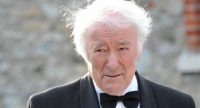
by Thomas McCarthy
It is too early, yet, to think about the literary meaning of the unexpected passing of poet Seamus Heaney nearly a year ago says Thomas McCarthy. It was a catastrophe that fell upon us all, the day Seamus Heaney died. I attended his removal at Donnybrook church that Sunday night and the funeral Mass the next day. I didn’t travel north to Co Derry, but a huge contingent of Southern poets did make the journey across the border behind the Presidential cavalcade. A long line of poets, journalists, politicians and rock stars crowded round his coffin and hospitality was shown to all strangers by his beloved Bellaghy GAA club. The quality of the huge crowd at his funeral mass in Donnybrook — the grandeur of the audience, as Micheál Mac Liammóir used to say, was proof that something prodigious in Irish life had passed away. It had the atmosphere of a state funeral, but with Seamus as a kind of matinee idol, the Valentino, the John MacCormack or Jack Doyle; as well as a man of the people, always a Bellaghy GAA man. More.
Empathy and the Poetic Imagination
by Bruce Bond
For every poet as ventriloquist, there is a planet made of tongues. Birds talk. Chairs respond. The dead rise and give advice, and in so doing they throw their voices into us. Hard to tell at times just who is talking, where the font of agency begins. What we do know is that the poetic imagination could not exist without some sense of reciprocity in its chamber of thrown voices. The poem thus is a kind of doll that surprises the child with what it says, with the ongoing dialogue between her inner depths and outer reaches. The poem’s cave that takes some voice into the dark returns that voice in a new inflection. What is the human throat if not a cave? In the echo chamber of poetic resonance, poems articulate something fundamental about the reciprocal and seminal power exchange in all language. We speak and so are spoken, and what we speak about in turn speaks of us. More.
Stephen King, “Falling,” and My Father’s Poetry
by Christopher Dickey
The great teller of supernatural horror stories says he admires my father’s poetry. My father, for his part, believed the poet had something like supernatural powers. Thank you, Stephen King. How many times have your stories kept me awake at night wondering, like a child in the dark, what monsters lurk nearby? You are one hell of a writer, and I think most of us in the business understand this: you think very carefully about our craft. So of course I read your recent interview with Jessica Lahey in The Atlantic on how you teach writing. And there, in paragraph seven, I found these lines: “When it comes to literature, the best luck I ever had with high school students was teaching James Dickey’s long poem ”Falling." More.
When the War Is Over
by Matthew Zapruder
“When the War Is Over” appeared in W.S. Merwin’s classic volume The Lice, in 1967 at the height of the Vietnam War. As the most recent anniversary (the 11th) of the beginning of the latest war in Iraq (a.k.a. Operation Iraqi Freedom) came and went, I thought about this poem. I remembered how, in the months leading up to the invasion, hundreds of thousands of people peaceably moved through the streets of the world’s cities, protesting the war, feeling helpless. The media and government were solemnly discussing what was clearly an act of insanity. And I was thinking about what it means that now, after more than 10 years, war at last is ending, or has ended, or has ended once again, even though at times it seems most certainly to be going on still, certainly for those who live there, even if we who were watching are mostly and cruelly on to other things. More.
Remembering Seamus Heaney
Drafts & Fragments
ISIS Pens Poem about 72 Virgins to Ignite Base
by Paul Sperry
How do Islamic extremists fire up the troops? Poems about virgins, of course. During a investigation into home-grown terrorists, the FBI monitored communication between two Boston Muslims, Tarek Mehanna and Ahmad Abousamra. Mehanna would be charged with aiding al Qaeda and given 17 years in prison, Abousamra fled the US before arrest, and is now serving as chief propagandist for ISIS. More.
How do Islamic extremists fire up the troops? Poems about virgins, of course
Poetry In the News
Back From the Brink, Poetry Group Makes Cash Prizes Bigger Thanks to a Grant
The National Poetry Series has upgraded the prize available to the winners of its annual Open Competition for unpublished books of poetry. The series also announced the first five winners of the beefed-up award. Part of the prize – the part that for many poets is the most crucial – remains unchanged: the series arranges for the publication of the winning books. But the prize also includes a cash award, which has been raised to $10,000 from $1,000, thanks to a grant from the Lannan Foundation, which has awarded literary prizes since 1989. More.
Hollins Professor Eric Trethewey Was ‘Fine, Strong Poet’

Eric Trethewey taught poetry to graduate students aiming to become the next great American poets. He taught poetry to jail inmates looking for a constructive outlet for their torments. He also taught poetry to his daughter, Natasha, who grew up to be a Pulitzer Prize winner and the 19th U.S. poet laureate. News of the 71-year-old Hollins University professor’s death left the campus surprised and saddened on Monday. More.
Line by Line, E-Books Turn Poet-Friendly
When John Ashbery, the Pulitzer Prize-winning poet, first learned that the digital editions of his poetry looked nothing like the print version, he was stunned. There were no line breaks, and the stanzas had been jammed together into a block of text that looked like prose. The careful architecture of his poems had been leveled. He complained to his publisher, Ecco, and those four e-books were immediately withdrawn. That was three years ago, and digital publishing has evolved a lot since then. More.
Friends, family, and Hollins community mourn the passing of Eric Trethewey.
New Books
Reliquaria by R. A. Villanueva
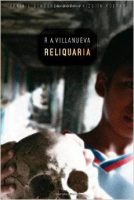
[Paperback] University of Nebraska Press, 82 pp., $17.95
In his prize-winning poetry collection Reliquaria, R. A. Villanueva embraces liminal, in-between spaces in considering an ever-evolving Filipino American identity. Languages and cultures collide; mythologies and faiths echo and resound. Part haunting, part prayer, part prophecy, these poems resonate with the voices of the dead and those who remember them. In this remarkable book, we enter the vessel of memory, the vessel of the body. The dead act as witness, the living as chimera, and we learn that whatever the state of the body, this much rings true: every ode is an elegy; each elegy is always an ode.
Millennial Teeth by Dan Albergotti
[Paperback] Southern Illinois University Press, 80 pp., $15.95
The poetry in Millennial Teeth will feel both refreshingly new and strangely familiar to Albergotti’s audience. Some poems pay direct tribute to such literary luminaries as Wallace Stevens and Philip Larkin, while others give nods to icons of pop culture, from Radiohead to Roman Polanski. The narrator muses on the resurrection of Christina the Astonishing, the works of Coleridge, and the mindless duties of minor players in Shakespeare’s Hamlet.
Once in the West: Poems by Christian Wiman
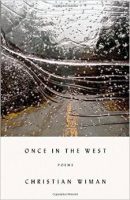
[Hardcover] Farrar, Straus and Giroux, 128 pp.,$23.00
Once in the West, Christian Wiman’s fourth collection, is as intense and intimate as poetry gets—from the “suffering of primal silence” that it plumbs to the “rockshriek of joy” that it achieves and enables. Readers of Wiman’s earlier books will recognize the sharp characterizations and humor—“From her I learned the earthworm’s exemplary open-mindedness, / its engine of discriminate shit”—as well as his particular brand of reverent rage: “Lord if I implore you please just please leave me alone / is that a prayer that’s every instant answered?” But there is something new here, too: moving love poems to his wife, tender glimpses of his children, and, amid the onslaughts of illness and fear and failures, “a trace / of peace.”
Retrievals by Garrett Caples
[Hardcover] Wave Books, 304 pp., $30.00
"Caples supplies us with a full aesthetic meal, with alarming images right out of the French Surrealists. He also means what he says; regardless of any implications to the contrary, Caples is writing out of emotion, even well-done sentiment." —Rain Taxi
City of Eternal Spring by Afaa Michael Weaver
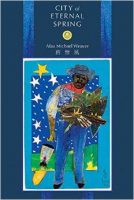
[Paperback] University of Pittsburgh Press, 96 pp., $15.95
City of Eternal Spring chronicles Weaver’s travels abroad in Taiwan and China, as well as showing the limits of cultural influence.
“Languages and cultures collide; mythologies and faiths echo and resound. Part haunting, part prayer, part prophecy, these poems resonate with the voices of the dead and those who remember them.”
Correspondences
Interviews With Poets-Day 2– Carl Phillips
by Erin Belieu
Good morning (it’s morning here). How are you? I’ve got a case of the coffee manics as I went to bed at1:30 (Adam started a late night conversation about popular misreadings of the Daoist gender binary. Sexy!), then woke up at 6 AM as Jude had to be at Cross Country practice because shared suffering and sleep deprivation make you run faster. Continuing my poetry interviews, today we have Carl Phillips. I’m feeling good about wrangling him into this. Carl’s plenty opinionated, but when the mic goes on he may choose to bound into the forest like the ghost stag of myth and legend. More.
A Conversation with the Past: Edward Hirsch and David Lehman at the New School

by Danielle Elizabeth Chin
On September 3rd, a full house of eager poets, professors, students, and friends gathered at The New School for the season’s first poetry forum, featuring Edward Hirsch, poet, critic, anthologist, and president of the Guggenheim Foundation. Hirsch and moderator David Lehman spoke like old friends, for over an hour, without missing a beat between questions and comments. Lehman began by asking Hirsch to read the poem with which he opens his recent anthology (Houghton Mifflin Harcourt, 2014). It is a love poem, to poetry. More.
Christian Wiman On Poetry And Faith
by Andrew Sullivan
I was on break when Matt Sitman’s Deep Dish essay on Christian Wiman and the need to find new language for Christianity in modernity appeared. If you read the essay, you’ll see why Matt is such an integral part of the Dish team, both in terms of the depth of his reading, the elegance of his writing, and the miracle of his enduring faith. Matt and I also had a chance to sit down with Wiman and talk to him about what it really means to be an intelligent, modern person who is also a non-fundamentalist Christian. Here’s a segment from our conversation when Wiman talks about his descent into unbelief, around his cancer diagnosis, and how he found a way forward through writing poetry that surprised him with its lingering hope. More.
Edward Hirsch and David Lehman open the season’s first poetry forum at the New School.
Envoi: Editor’s Notes
Lessons from the Past: Robert Hass
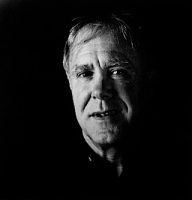
"If I see people on the street corner and the phrase "nagged by wind" comes into my head, then I have a little bit of music and I can do something. But ideas almost never help. There's a famous story about Degas, the painter, who late in life fell in love with the idea of writing poetry and started writing sonnets. Then he got stuck, and when he ran into Mallarmé, the French poet, he said, "I have a million ideas, but I can't get anywhere." And Mallarmé said, "But Degas, poems aren't made out of ideas, they're made out of words."
—from The Language of Life by Bill Moyers
“Ideas almost never help.”